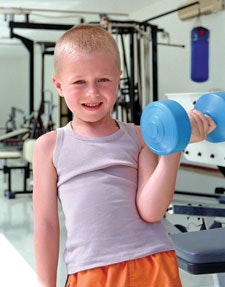Childhood obesity has tripled over the past 30 years. It's a problem being addressed by schools, communities, families and government programs, with the clear consensus that our kids need to be eating better and exercising more.
 Community weight-loss competitions have reached the youth level. (Image © Mike Kiev/Istockphoto.com)
Community weight-loss competitions have reached the youth level. (Image © Mike Kiev/Istockphoto.com)Childhood obesity has tripled over the past 30 years. It's a problem being addressed by schools, communities, families and government programs, with the clear consensus that our kids need to be eating better and exercising more.
The Galesburg (Ill.) Recreation Department and Knox County YMCA had heard it all, and - like many communities implementing campaigns to raise awareness, get kids active and improve nutrition - were looking for different ways to help youths in Knox County adopt healthier habits.
"We've tried in the past to get kids involved," says Justin Inskeep, senior program director for the Knox YMCA. "We offered programs, put some different things together to get kids active, but we were unsuccessful." Despite interactive game rooms, a kids' climbing wall and a range of youth-centered programming, neither the YMCA nor the recreation department had found anything to keep the young people engaged.
So the program providers teamed up to try a different approach, a straightforward program that addressed the issue without sugarcoating it: The Great Galesburg Weight Race, a weight-loss competition open to residents from ages 7 to 18.
"Some may say we're trying to do something a little bit extravagant," says Inskeep. "We're really trying to do the best we can to have our community adopt healthy lifestyles."
Weight-loss competitions for adults have been held with mixed results at gyms and health clubs for many years, but applying them at the youth level was new territory for Galesburg. Dieting programs for younger children are a touchy subject; many object to the idea of encouraging a growing and developing child to drop some pounds. Child psychologists also question whether younger children are capable of understanding concepts of healthy dieting and weight loss and are concerned that the participants may focus more on the prize incentives than their own health. While the organizers of the Great Galesburg Weight Race are aware of those issues, they don't think they are a problem.
"We really haven't heard anything negative," says Roger Sensabaugh, Galesburg's recreation superintendent. "We've heard mostly positive things, especially from individuals who have signed up. One mother said it was long overdue."
The contest, which began in November and runs through March, is divided into three age groups: 7-10, 11-14 and 15-18. With free access to the Y on Tuesday and Thursday evenings, the recreation department's youth fitness center on Monday and Wednesday evenings and the municipal pool during all open swim times, the contest attempts to accommodate the schedules and interests of all involved. Younger children can enjoy interactive play equipment and a game room, while teens might be more interested in weight lifting and cardio fitness equipment. Participants of all ages also have opportunities to attend various sports clinics and meet with a dietitian on a twice-monthly basis. Weigh-ins are held once a week with progress tracked using assigned numbers to ensure privacy.
While the contest encourages participants to shed pounds, the emphasis is not on weight loss so much as the association between being active and one's personal health. The big draw may be the prize incentives - including family season passes to the local water park, new clothes, bicycles and tuition waivers to the local community college - but the goal is to expose kids to different ways they can be active and encourage them to explore new activities. At the same time, participants are learning about nutrition and seeing the results of their lifestyle changes reflected during the weigh-ins.
"The whole idea is to get these youths to get up and maybe find something they might enjoy," Sensabaugh says. Transformative weight loss is not expected, but the program aims to address the issue of childhood obesity and the importance of exercise in a way kids will understand and enjoy. "What we have attempted to do is come up with a different idea, an idea that will attract youths to want to take part in a program that fights obesity."
Despite the weight-loss component, all kids in the community are welcome to participate in the program, even those who already practice healthful habits. "We are encouraging them to sign up, as well," says Sensabaugh. For already-active youths, the incentive is not so much the prizes for weight loss (though everyone who participates will receive some sort of prize) but the $6 program fee that gives them access to the resources of the Y and the recreation center for the duration of the contest. "They're probably more active anyway, so for $6, being able to use everything that the city and the Y have to offer is a pretty good deal," Sensabaugh says, adding that a one-time admission to open swim at the municipal pool is $5.
Inskeep sees the program as an opportunity not just for youths to improve their fitness, but parents as well. "We're encouraging the parents to take an active role in playing with the kids, getting out and exercising with them," he says. "We're focusing on the youths, but we really want to expand that to get parents equally involved."
Parents are also asked to support their children in understanding healthy eating habits and make changes at home - skipping the fast food, reducing time spent in front of the TV or computer - moves that will benefit the entire family. Sensabaugh thinks that parents' involvement should also help mitigate concerns from others about younger children participating in the program. "We don't anticipate that kids are going to read the information and then go starve themselves for prizes," he says. "We certainly don't want that to happen. The parents still have to play an active role. They have to ensure their kids are eating and exercising properly."
When the final awards are given out in March, organizers hope the mental transformation generated by the program carries more weight than the physical. Success will be measured not in the number of pounds lost but the number of kids and families who continue to be active. "If we can pull it off and it comes even close to being successful, we'd like to see about improving it," says Sensabaugh. "We don't know if this will be the right mix, but we're certainly going to continue to try. That's all we can do, keep plugging away."





































